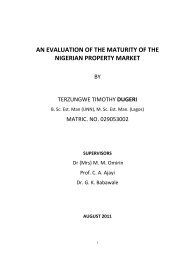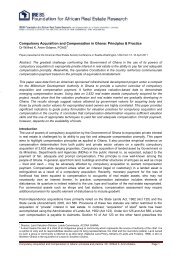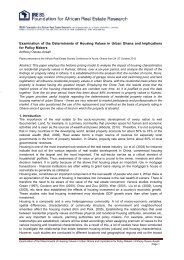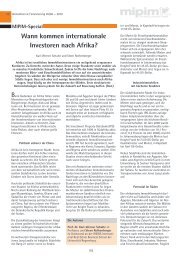You also want an ePaper? Increase the reach of your titles
YUMPU automatically turns print PDFs into web optimized ePapers that Google loves.
certificates and other documents may have to be submitted.The acquisition by residents of assets outside the CommonMonetary Area is also regulated.Exchange control approval is required for:a loan by a non-resident to a South <strong>Africa</strong>n resident. TheReserve Bank will generally not permit interest exceedingthe local prime overdraft rate for loans by non-residentshareholders to their local subsidiaries but may allow aninterest rate of 3% above the prime rate for loans by othernon-residents;payment of management, services and other fees by aresident to a non-resident. The criterion used to assessthese payments is whether they are “armslength”;payment of royalties, licence and similar fees to nonresidentsfor the right to use know-how, patents,trademarks, copyright or other intellectual property.Approval will generally be given for royalties of 2% to 4% ofturnover for manufactured goods and 2% to 6% of turnoverfor capital goods;the sale of South <strong>Africa</strong>n intellectual property to a nonresident(although there is case law that exchange controlapproval is not required).TaxationIncome tax is levied on the worldwide income of South <strong>Africa</strong>nresidents subject to certain exemptions. Non-residents arehowever only taxed on their South <strong>Africa</strong>n sourced income.There is no provision for group taxation.Currently tax is levied on income from actual and deemed South<strong>Africa</strong>n sources. The standard corporate tax rate is 28% for bothresident companies, close corporations and external companies(branches of foreign companies – the rate for externalcompanies was reduced from 33% with effect from 1 April <strong>2012</strong>).As dividends are taxed from 1 April <strong>2012</strong> foreign investors mayprefer operating through external companies. Special rulesapply for gold mining companies, small business corporationsand micro businesses. Individuals pay tax on a sliding scale with amaximum rate of 40%. Trusts pay tax at 40% of income retainedand not awarded to beneficiaries.There is:a tax 15% on dividends which came into effect on 1 April<strong>2012</strong>. It replaces secondary tax on companies (STC) whichwas payable by companies (but not external companies) at10% of the excess of dividends declared over dividendsreceived by the company and resulted in an effectivecorporate tax rate of 34.54% if the company declareddividends;a net withholding tax of 12% of gross royalty payments tonon-residents although double tax treaties may providerelief in appropriate cases. It has been proposed toincrease the rate to 15% but no date for this change hasbeen announced.value added tax at 14% (certain exemptions and zeroratings apply) ;capital gains tax at an effective rate of 18.6% for allcompanies (the rate differs dependingon the status of the taxpayer). It waspreviously 14% and the increase appliesfrom 1 March <strong>2012</strong>. Certainexemptions were also increased;a number of other specific taxes and70duties including donations tax (20%), estate duty (20%),duty on the transfer of immovable property, securitiestransfer tax, stamp duties on certain leases and skillsdevelopment levies.Foreign dividends paid to residents may be subject to incometax. A 15% withholding tax on interest paid to non residents willapply with effect from 1 January 2013 subject to certainexemptions (including Government debt and listed debtinterests) and double tax relief;There are various capital allowances and deductions as well asrules regulating transfer pricing and thin capitalization.South <strong>Africa</strong> has double taxation agreements with more than 60countries including the Netherlands, Canada, India, Indonesia,Iran, Italy, Japan, Malawi, the Peoples Republic of China,Singapore, Taiwan, Tunisia, Uganda, Zambia, Ireland, Pakistan,Russia, Sweden, Norway, United Kingdom, Germany, USA,Korea, Israel, France, Lesotho, Botswana, Mauritius, Namibia,and Zimbabwe.Regulatory EnvironmentThe Competition Commission, Competition Tribunal andCompetition Appeal Court deal with merger control, restrictivebusiness practices and abuses and price discrimination bydominant firms. Several cartels have been successfullyprosecuted by the Competition Commission with the impositionof severe financial penalties. An amendment to the CompetitionAct provides for the criminalisation of cartel conduct but has notyet taken effect.The Takeover Regulation Panel regulates acquisitions andtakeovers of all public companies, state owned companies andcertain private companies. The new Companies Act (which cameinto force on 1 May 2011) fundamentally reformed South <strong>Africa</strong>ncompany law including codifying the fiduciary duties ofdirectors, strengthening corporate governance rules,significantly expanding protections for minority shareholdersand introducing new “business rescue” (similar to the USA’sChapter 11) and “merger” concepts.The JSE Limited is the largest securities exchange in <strong>Africa</strong> andhas regulations governing companies listed on it. The FinancialServices Board supervises the activities of financial institutionsand financial service providers. Banks are regulated by theRegistrar of Banks. Telecommunications, broadcasting, medicalschemes, short and long term insurance, pension funds,medicines and pharmaceuticals, gambling and lotteries areregulated under separate legislation and regulators. There is alsoenvironmental legislation which imposes personal liability ondirectors of contravening firms in certain circumstances.The Consumer Protection Act and National ConsumerCommission provides significant protection for consumers(defined as individuals and entities with turnover or assetsunder R2 million) and franchisees. The National Credit Act alsoprotects consumers by regulating the extension of credit andenforcement of debts in certain circumstances. The Promotionof Access to Information Act allows access to Government andprivate firm information in certain circumstances. Personal dataprotection legislation is currently before Parliament.There are strict anti-corruption laws as well as “know your










